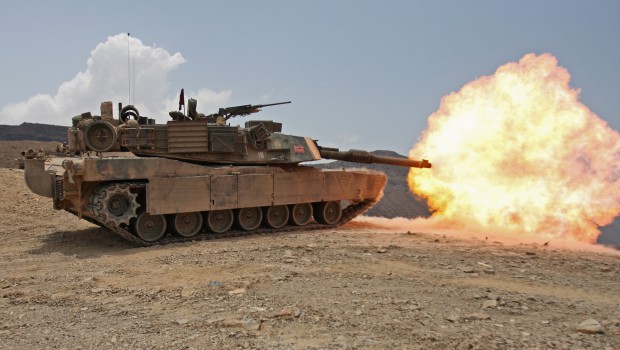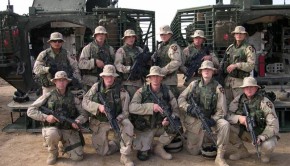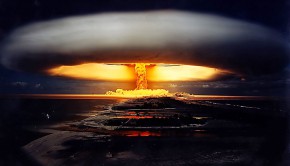WAR!!! Holy or Not – is God on our Side?
Now that we are at war the big question on every ones mind is, whose side is God on? This is a very complex question as everyone, especially the enemy, think their God is on their side and that He will assure them victory.
But yes, God does exist and He remains ONE even though He may be perceived as different things to different people in different parts of the world according to one’s angle of vision and/or religious or cultural upbringing. In other words, to give the simplest analogy, one who lives in Arizona may think the sun is an Arizona sun or one who lives in Germany may think it is a German sun and so forth but the fact is this, the sun is spread everywhere and remains ONE. The sun does not discriminate, that is, someone basking in the sun in Bermuda experiences the same sunlight as another person in prison looking out at the world from their cell. Likewise, if someone in another part of the world cannot see that same sun this does not mean the sun is not shining. On a cloudy day we may say that the sun is not there but we know it exists nevertheless. Such is God. We may have different perceptions but He also exists even though we may not “perceive” Him or see Him. This is common sense. Therefore, the ancient Vedic texts also state that God is impartial and yet, as contradictory as this may sound, He is partial toward the righteous or those who have surrendered to His will. But what is God’s will? (See my articles “Implementing A Vedic Society – Parts One and Two”).
AHIMSA
“Ahimsa” in Sanskrit means nonviolence. But what is its real meaning?
According to A.C. Bhaktivedanta Swami Prabhupada the Founder-acarya of the International Society for Krishna Consciousness, in one of his purports to the Bhagavad-gita (10.5) He states:
“Ahimsa, nonviolence, means that one should not do anything that will put others into misery or confusion. Material activities that are promised by so many politicians, sociologists, philanthropists, etc., do not produce very good results. Because the politicians and philanthropists have no transcendental vision; they do not know what is actually beneficial for human society. Ahimsa means that people should be trained in such a way that the full utilization of the human body can be achieved. The human body is meant for spiritual realization, so any movement or any commissions which do not further that end commit violence on the human body. That which furthers the future happiness of the people in general is called nonviolence.”
And again in (Bg. 13.12) Srila Prabhupada states:
“Nonviolence is generally taken to mean not killing or destroying the body, but actually nonviolence means to not put others into distress. People in general are trapped by ignorance in the material concept of life, and they perpetually suffer material pains. So unless one elevates people to spiritual knowledge, one is practicing violence. One should try his best to distribute real knowledge to the people, so that they may become enlightened and leave this material entanglement. That is nonviolence.”
There may be disagreement as to the nature of “real knowledge” but for those who are not familiar with the Vedic literatures it is Krsna who is none other than that ONE God almighty Himself and the origin of all that be. The best analogy Srila Prabhupada gave (one of many) is the doctor who must use his scalpel to cut the patient open to remove a cancer in order to save the patient. If that same doctor were to run out and use that same knife on someone else, it would be murder or an act of violence. While this may also be based upon ones perspective, the fact remains that in war, and sometimes war in inevitable according to time and place, God or Krsna will “arrange” a situation in which righteousness will overcome and defeat evil or demoniac natures. He does this to re-establish religious principles that He Himself has set into motion in human society and at the same time protect His devotees or the theists. But wait. How can God advocate a world war? Doesn’t this run contrary to the principles of peace and nonviolence?
THE MAHABHARATA
Perhaps the largest and oldest epic Sanskrit history of the world is the 100,000 verse “Mahabharata” which means “great India.” It was compiled 5,000 years ago by Lord Krsna’s literary incarnation Srila Krsna Dvapayana Vyasadeva who also put to write the monumental 18,000 verse Srimad-Bhagavatam, considered the “crown jewel” of all the Vedas. Srila Vyasadeva’s assitant in the writing of this work was none other than “Ganesa,” who holds a very prominent place in the pantheon of demigods.
Mahabharata then is not an ordinary novel as we in the west have come to know literature and while there are those supposed religious scholars who want to classify such as “myth” or quaint folklore, in essence; it is actual fact. Just as one documenting the battle of D-Day in World War Two to people 5,000 years from now. While it is historical fact, and while there were major personalities fighting in that war such as generals etc. there may be those who find this episode unbelievable. The Mahabharata then is not an ordinary treatise because of the presence of lord Sri Krsna and the events related to Him. One would have to give up the notion through knowledge and realization of course to realize this very essential point. That Krsna is God and not just a handsome Prince with astute philosophical observations and that what he says is absolute truth is the final thrust of the gita itself. This comes from reading and hearing the Vedas to assimilate its true meaning.
Very briefly, Mahabharata deals with two feuding dynasties, the Kurus and the Pandavas culminating in the the famous, “Bhagavad-gita” which means “song of God.” That is, the gita itself consisting of 700 verses is a battlefield dialogue between the warrior Arjuna and spoken by Lord Sri Krsna Himself. This is actually the heart and soul of the Mahabharata. While the story leading up to this great battle is mammoth in scope; it was a fratricidal conflict between the 100 sons of the blind King Dhrtarastra and his son Duryodhana and on the opposing side their cousins the Pandavas. Unique to this story is the fact that Krsna puts Arjuna into illusion regarding his apprehension at seeing his kinsmen prepared for battle. Regarding his “duty” as a soldier or “ksatriya,” Krsna begins to enlighten Arjuna as to the nature of the self and reveal transcendental knowledge regarding the “self” in a manner that future generations can also understand today; issues concerning the nature of the soul, God and our eternal relationship with Him.
While God, or Krsna remains invisible to the living entity then, as in the previous analogy of the sun covered by clouds, He exists just the same. To eradicate any doubts in this regard we turn to a purport from the Srimad-Bhagavatam by Srila Prabhupada (6.4.24):
“The transcendental position of the Supreme Personality of Godhead (Krsna) is not perceivable by the conditioned souls, who are accustomed to material vision and cannot understand that the Supreme Personality of Godhead exists in His abode, which is beyond that vision. Even if a materialistic person could count all the atoms in the universe, he would still be unable to understand the Supreme Personality of Godhead. The conditioned souls may try to understand the Supreme Personality of Godhead for many billions of years through their mental speculative processes, traveling at the speed of the mind or the wind, but still the Absolute Truth will remain inconceivable to them because a materialistic person cannot measure the length and breadth of the Supreme Personality of Godhead’s unlimited existence. If the Absolute Truth is beyond measurement, one may ask, how can one realize Him? The answer is given here by the word “svayambhuve” (unto the Supreme Lord, who is manifest with no cause), one may understand Him or not, but nevertheless He is existing in His own spiritual potency.”
Although Krsna is the actual hero of the Mahabharata, the beauty of his position within this great work is that while appearing as a human being in an aristocratic dynasty, (The Pandu dynasty), He is God almighty Himself. Therefore, He appeared in the Pandu dynasty and was seen face to face. Thus, Krsna is no ordinary person.
To corroborate this further, one of the great Vaisnava devotee saints living 500 years ago, Srila Rupa Goswami wrote many books on the subject of Krsna. He was a staunch devotee of Krsna consciousness and an erudite scholar on the subject of Vedic thought. In one of his many important and illuminating works, Bhakti-rasamrta-sindhu or “The Nectar of Devotion,” he delineates the various aspects of bhakti-yoga, or the nature of devotional service to Lord Sri Krsna. Bhakti-yoga means, love and devotion. In that book, he relates a meeting between the great saint Narada Muni and King Yudhisthira who had just been enthroned as emperor of the world. Narada says to Yudhisthira (translations by Srila Prabhupada):
“My dear King Yudhisthira, in this world you (the Pandava brothers) are the only fortunate people. The Supreme Personality of Godhead has appeared on this planet and is presenting Himself to you as an ordinary human being. He is always with you in all circumstances. He is living with you and covering Himself from the eyes of others. Others cannot understand that He is the Supreme Lord, but He is still living with you as your cousin, as your friend and even as your messenger. Therefore, you must know that nobody in this world is more fortunate than you.”
Now that we have presented an inkling of the superiority of Krsna, we will set the stage for one of the biggest battles in human history, the battle of Kuruksetra.
In this massive battle that would last 18 days and where 640 million soldiers would be slain, Krsna agrees to become the charioteer for His friend and warrior, Arjuna. These warriors were known as “ksatriyas” and were expert in the military sciences. In those days, ksatryias knew how to use sound vibrations or “mantras” to direct weapons and in fact had a weapon known as the “brahmastra” that was nuclear in origin but rather than explode like today’s nuclear devices, it imploded and in fact could be targeted like a laser with tremendous heat and light in defeating the enemy. There were also water weapons that could counteract fire weapons and the art of warfare 5,000 years ago can be said to have harnessed mystical weaponry still unknown by today’s high technology and both sides were expert in their delivery. These are facts. In Vedic times there were also codes of war regarding time, place and circumstance. A ksatriyas duty then was to kill to uphold Vedic law and protect the citizenry and even the king would not return to his kingdom unless he was wounded in battle. It may also be noted that while the figure of 640 million soldiers is an inconceivable number compared to today’s statistics, there was only one king who basically ruled the world and so on the battlefield many nations participated and met for combat in one place. Later, other kings were enthroned in various parts of the globe known as the “seven islands” that is, Australasia, Europe, Oceania etc.
KSATRIYAS and RELIGIOUS PRINCIPLES
When we say that it was a ksatriya’s duty to kill, this killing was not done whimsically but to uphold religious principles and annihilate demonic or ungodly elements within society. Defining a ksatriya’s specific duty Srila Prabhupada writes, (Bg.2.32)
“For a ksatriya to be on the battlefield and to become nonviolent is the philosophy of fools. In the Parasara-smrti, or religious codes made by Parasara, the great sage and father of Vyasadeva, it is stated: “The ksatriyas duty is to protect the citizens from all kinds of difficulties, and for that reason he has to apply violence in suitable cases for law and order. Therefore, he has to conquer the soldiers of inimical kings, and thus, with religious principles, he should rule over the world.”
The next question may be raised that one man’s religious principles may be another man’s poison. After all, don’t other nations go to war over what they believe to be their religious principles? This is a very valid question and one that requires insight and realization. In doing so, we will turn to the law books known as the Srimad-Bhagavatam for a definition of real religious principles: (Translation and purport by Srila Prabhupada): 6.3.19
dharman tu saksad bhagavat-pranitam
na vai vidur rsayo napi devah
na siddha-mukhya asura manusyah
kuto nu vidyadhara-caranadayah
TRANSLATION
Real religious principles are enacted by the Supreme Personality of Godhead. Although fully situated in the mode of goodness, even the great rsis who occupy the topmost planets cannot ascertain the real religious principles, nor can the demigods or the leaders of Siddhaloka, to say nothing of the asuras, ordinary human beings, Vidyadharas and Caranas.
PURPORT
“When challenged by the Visnudutas to describe the principles of religion, the Yamadutas said, veda-pranihito dharmah: the religious principles are the principles enacted in the Vedic literature.”
Elsewhere in that same purport, Srila Prabhupada writes:
“Herein it is stated that the real religious principle is that which is given by the Supreme Personality of Godhead (Krsna). The principle is stated in the Bhagavad-gita. Sarva-dharman parityajya mam ekam saranam vraja: that one should give up all other duties and surrender unto the lotus feet of Krsna. That is the real religious principle everyone should follow. Even though one follows Vedic scriptures, one may not know this transcendental principle, for it is not known to everyone. To say nothing of human beings, even the demigods in the upper planetary systems are unaware of it. This transcendental religious principle must be understood from the Supreme Personality of Godhead directly or from His special representative.”
And continuing in the next sloka (SB. 6.3.20-21) the translation reads as follows:
Lord Brahma, Bhagavan, Narada, Lord Siva, the four Kumaras, Lord Kapila (the son of Devahuti), Svayambhuva Manu, Prahlada Maharaja, Janaka Maharaja, Grandfather Bhisma, Bali Maharaja, Sukadeva Goswami and I myself (Lord Yamaraja the constable of death), know the real religious principle. My dear servants (the Yamadutas), this transcendental religious principle, which is known as bhagavata-dharma, or surrender unto the Supreme Lord and love for Him, is uncontaminated by the material modes of nature (goodness, passion and ignorance). It is very confidential and difficult for ordinary human beings to understand, but if by chance one fortunately understands it, he is immediately liberated, and thus he returns home, back to Godhead.
In addition, according to Lord Caitanya Mahaprabhu (see “Implementing a Vedic Society- One and Two), the ultimate religious principle in this age of Kali is the chanting of the holy names of Krsna; Hare Krsna, Hare Krsna, Krsna, Krsna, Hare, Hare/ Hare Rama, Hare Rama, Rama, Rama, Hare, Hare.
Thus, religious principles have been explained according to the Vedic law books. For further elucidation and to gain faith and conviction in these conclusions, one must hear and read these ancient Sanskrit texts particularly from the via medium of God, the spiritual master. With Arjuna However, he was seeing God face to face by virtue of the word “svayam” which means “in person.”
The conclusion then is that Krsna is the only source of the Vedas and religious principles in general. He Himself says this in Bg. 15.15:
“I am seated in everyone’s heart, and from Me come remembrance, knowledge and forgetfulness. By all the Vedas I am to be known. Indeed, I am the compiler of Vedanta, and I am the knower of the Vedas.”
Demons then are basically atheistic in temperament and are averse to not only the laws of God as set forth in the Vedas, but also to the very existence of God. This is due to envy.
What of those who are demonic? What are their characteristics? Which brings us full circle to the idea of whose side is God on. According to Lord Krsna Himself, he states in the Bhagavad-gita 16.7-8-9-10-11-12-13-14-16-17:
” Those who are demoniac do not know what is to be done and what is not to be done. Neither cleanliness nor proper behavior nor truth is found in them. They say that this world is unreal, with no foundation, no God in control. They say it is produced of sex desire and has no cause other than lust. Following such conclusions, the demoniac, who are lost to themselves and who have no intelligence, engage in unbeneficial, horrible works meant to destroy the world.”
Author’s note: Today, this may indicate terrorism but Srila Prabhupada in his purport to the above sloka stated Bg. 16.9:
“Indirectly, this verse anticipates the invention of nuclear weapons, of which the whole world today is very proud. At any moment war may take place, and these atomic weapons may create havoc. Such things are created solely for the destruction of the world, and this is indicated here. Due to Godlessness, such weapons are invented in human society; they are not meant for the peace and prosperity of the world.”
Continuing with Krsna’s statements from the gita:
“Taking shelter of insatiable lust and absorbed in the conceit of pride and false prestige, the demoniac, thus illusioned, are always sworn to unclean work, attracted by the impermanent. They believe to gratify the senses is the prime necessity of human civilization. Thus until the end of life their anxiety is immeasurable. Bound by a network of hundreds of thousands of desires and absorbed in lust and anger, they secure money by illegal means for sense gratification. Thus perplexed by various anxieties and bound by a network of illusions, they become too strongly attached to sense enjoyment and fall down into hell. Self-complacent and always impudent, deluded by wealth and false prestige, they sometimes proudly perform sacrifices in name only, without following any rules and regulations. Bewildered by false ego, strength, pride, lust and anger, the demons become envious of the Supreme Personality of Godhead, who is situated in their own bodies and in the bodies of others, and blaspheme against the real religion.”
Arjuna, being perplexed about his duty tells Krsna in Bg.1.36:
“Sin will overcome us if we slay such aggressors. Therefore it is not proper for us to kill the sons of Dhrtarastra and our friends. What should we gain, O Krsna, husband of the goddess of fortune, and how could we be happy by killing our own kinsmen?”
Srila Prabhupada writes in his purport to this verse; Bg.1.36
“According to Vedic injunctions there are six kinds of aggressors: (1) a poison giver (2) one who sets fire to a house (3) one who attacks with deadly weapons (4) one who plunders riches (5) one who occupies another’s land (6) one who kidnaps a wife. Such aggressors are at once to be killed, and no sin is incurred by killing such aggressors. Such killing of aggressors is quite befitting an ordinary man, but Arjuna was not an ordinary person. He was saintly by character, and therefore he wanted to deal with them (the opposing forces) in saintliness. This kind of saintliness, however, is not for a ksatriya. Although a responsible man in the administration of the state is required to be saintly, he should not be cowardly.”
FIGHTING TERRORISM-DOES GOD LOVE AMERICA?
Which brings us to the gist of this article. Is God, or Krsna on our side particularly since we are at war with terrorism? We will let God, Krsna decide.
This may sound somewhat nationalistic but it’s a fact that America is a great country. God has ordained this so for over 200 years. Compared to other countries around the world we have certain freedoms. We have tolerance and we do not attack other countries unless provoked. There may be political reasons unbeknownst to the citizens as to the whys of a particular nations doing what they do and it is admitted that no country is perfect in that respect, even America. It is also admitted that we are not in “Vedic times” per se and the current age is filled with bad elements worldwide.
But the facts are this, if indeed it’s as Krsna says in the Vedas that not a blade of grass moves without His sanction, then winning World War Two and other conflicts throughout the centuries is no accident. But why? I think the main reason is America’s religious tolerance, that is, one’s freedom to practice one’s faith notwithstanding the personal views of others who may be less tolerant or due to ignorance. After all, the “Hare Krishna” movement began in 1966 in the greatest city in the world, New York. The seeds of love of God were planted there by His Divine Grace Srila Prabhupada and temples were born that will soon sprout again giving the fruit of love of God, Krsna. In some strange way then, one could say that America has become a “tirtha” or holy place because Srila Prabhupada walked upon its land. If, after careful deliberation the leaders of America imbibe these ancient texts and actually see how these Vedic laws may be enacted in human society then America will truly be a great nation and as Srila Prabhupada once said, the whole world will follow. Will America be victorious? Everything rests with the arrangement of the almighty God. Time will tell, but as Krsna told Arjuna on the battlefield 5,000 years ago, all the soldiers on both sides are already dead by My arrangement.
You be but an instrument in the fighting. Of course, Arjuna and his brothers were the only survivors and Yudhisthira was enthroned as the righteous king. We can only imagine the bodies of millions dead at the end of the battle, the elephants and horses dismembered, the chariots smashed and crushed. One can only imagine a grief-stricken scene of widows walking through the blood-soaked field drenching the ground in an ocean of tears.
That is the nature of war. Meanwhile, it should be interesting to note that because Lord Krsna was personally present on the battlefield, all the soldiers slain got liberation.
For Krsna, the battle for Him was like a director making a movie and because the soul is eternal, those slain were just changing their bodies. One must understand this very deep and essential point. Once Arjuna realized this fact, he became fearless. The reader may draw their own conclusions.
Note: This article does not condone America’s involvement with the war against terrorism nor does it advocate war in general. Neither does it advocate NOT going to war depending upon circumstances. Rather, it is a response to those who may wonder if violence is ever to be condoned in a civilized society according to time and place. While knowing that these topics are controversial, it is this writer’s opinion only in presenting certain facts based upon Vedic historical evidence.
Bhakta Wallace has been a devotee of Krsna for 22 years and lives in Colorado.
vaikuntha@hotmail.com












